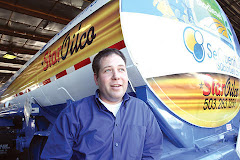"You know a problem has not been solved when there are ten different ways to deal with it."
Chris of
Trillium Fiber Fuels
(speaking on the subject of pretreating feedstocks in cellulosic ethanol production)
Monday, June 29, 2009
Sunday, June 14, 2009
Clean Coal Is Back on the Drawing Board
I suspected coal fired power would be a dead-end over the next four years. According to Wired.com not so much. In fact the Bush Administration's start towards "clean coal" via Carbon Sequestration is being continued with a future-gen CO2 capture project.
Just to get my enviro-street-cred 'I told you so' in as early as possible. How much you want to bet there is a major MTBE type problem with Carbon Sequestration that the brilliant engineers, chemists, and policy wonks failed to see? I just see deep well injection of anything and expect either sci-fi style earth quakes or Green Peace fundraising aquifers being effected.
I don't have any scientific basis for this. Just experience and a gut feeling. Critics please remember that I'm usually on the other side of this tech debate. Regardless, something about CO2 Sequestration just doesn't fit right.
Scientific America has a good article which does a great job of explaining the subject simply and in depth. What separates this deep injection method is the capture and mineralization (note: I don't know if that's even a real word) of the CO2 with surrounding geology.
A snippet from the article that gets right to the point:
The storage seems to be long term as well; the sequestered gas doesn’t just sit in the rock waiting for a chance to escape. Over decades it dissolves into the brine that shares the pore space or, over longer time spans, forms carbonate minerals with the surrounding rock, Hovorka notes. In fact, when she tried to pump CO2 out of her test site using natural gas extraction techniques, the attempts failed completely.
It's is an interesting science. But I see the more promising technologies being an approach to use the CO2 productively as a resource. I don't see dumping CO2 underground ever surviving as a long term strategy.
The activists and policy people I've met would fight this approach as hard and long as any other industry approach to simplify a reduction in pollution. Capture or dilution rarely are acceptable to true environmentalists. The only solution they accept (and the only one usually settled upon) is ultimately less pollution period.
This is a short term approach that no-doubt will work for petroleum and natural gas producers. Beyond those with capital experience in drilling deep holes though I don't see this as anything close to an acceptable solution for CO2 reduction by 2050 (the target year I hear policy wonks pointing to).
Sunday, June 7, 2009
Trolling bout Biodiesel
I saw a new press event for Propel Biofuels on the Biobased News site.
It seems like its been years since I've heard about Propel. I remember a few years ago they were poised to move forward boldly. Infused with V.C. cash and processing something more than that (a company chalked full of people filled with ability). They also had an awesome grasp of where to take the biofuel market to and therefore a compelling pitch to go with their business.
But after spending several hundred's of thousands of dollars building the best biodiesel infrastructure around Seattle their expectations didn't materialize. Of course nobody's expectations in the field did either. Now they are back pulling earned media and I like what I see.
Why do I like it? One self indulgent reason. Its the same argument and effort that I am making in Portland. I think they are correct except they are failing to see the real value in their business and intellectual property (which I will keep to myself). Its good to see your own logic and marketing packaging elsewhere.
It seems like its been years since I've heard about Propel. I remember a few years ago they were poised to move forward boldly. Infused with V.C. cash and processing something more than that (a company chalked full of people filled with ability). They also had an awesome grasp of where to take the biofuel market to and therefore a compelling pitch to go with their business.
But after spending several hundred's of thousands of dollars building the best biodiesel infrastructure around Seattle their expectations didn't materialize. Of course nobody's expectations in the field did either. Now they are back pulling earned media and I like what I see.
Why do I like it? One self indulgent reason. Its the same argument and effort that I am making in Portland. I think they are correct except they are failing to see the real value in their business and intellectual property (which I will keep to myself). Its good to see your own logic and marketing packaging elsewhere.
Subscribe to:
Posts (Atom)






